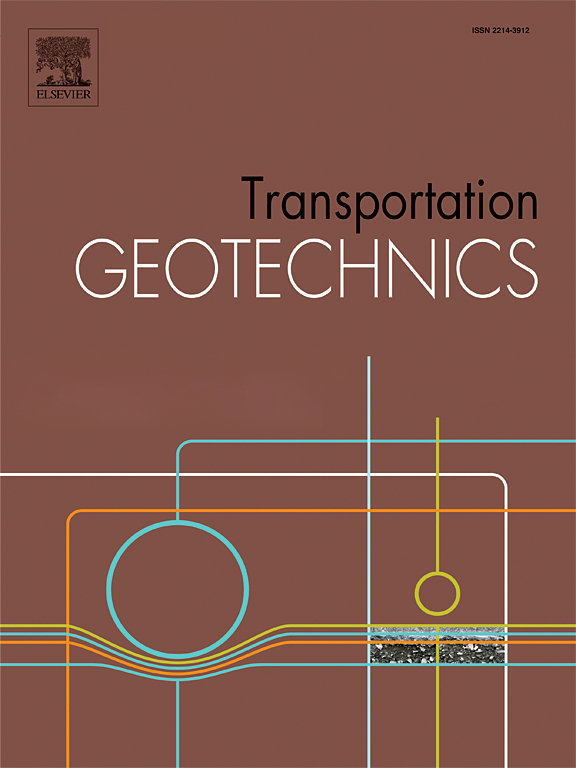Utilisation of construction and demolition waste and recycled glass for sustainable flexible pavements: A critical review
IF 4.9
2区 工程技术
Q1 ENGINEERING, CIVIL
引用次数: 0
Abstract
The heightened pressure on natural resources, coupled with unprecedented levels of waste and pollution, has created an urgent need for sustainable construction practices in the road industry. To this end, the use of recycled aggregates in pavement construction has gained significant attention due to their environmental, economic, and social benefits. However, despite their immense potential, the application of recycled materials in flexible pavements remains limited due to concerns over their long-term performance, variability in properties, environmental impacts and inconsistent specifications. This article provides a critical analysis of the current state of knowledge on the use of recycled aggregates, particularly recycled concrete aggregate (RCA), recycled crushed brick (RCB) and recycled crushed glass (RCG), for sustainable flexible pavement construction. By examining key laboratory and field investigations, this study evaluates the physical and mechanical characteristics of recycled materials and their blends and assess their suitability for use in pavements. While previous studies have demonstrated that recycled aggregates can be effectively used in pavements, their performance is influenced by factors, such as source, composition, gradation, age, degree of compaction, moisture content, and loading conditions. This study also assesses the suitability of predictive models in evaluating the resilient modulus and cumulative permanent deformation of recycled aggregates and their blends under cyclic loading, which could be used in the design of flexible pavements incorporating these materials. The main objective of this review is to promote wider adoption of aggregates derived from construction and demolition waste, as well as waste glass, in flexible pavements.
利用建筑和拆迁废物和可回收玻璃可持续柔性路面:一个关键的审查
自然资源的压力日益增大,再加上前所未有的废物和污染水平,迫切需要在道路工业中采取可持续的建筑做法。为此,在路面施工中使用再生骨料因其环境、经济和社会效益而受到了极大的关注。然而,尽管再生材料具有巨大的潜力,但由于对其长期性能、性能变化、环境影响和规格不一致的担忧,其在柔性路面中的应用仍然有限。本文对再生骨料的使用现状进行了批判性分析,特别是再生混凝土骨料(RCA),再生碎砖(RCB)和再生碎玻璃(RCG),用于可持续柔性路面施工。通过重点实验室和实地调查,本研究评估了回收材料及其混合物的物理和机械特性,并评估了它们在路面上使用的适用性。虽然先前的研究表明再生骨料可以有效地用于路面,但其性能受到诸如来源,组成,级配,年龄,压实程度,含水量和加载条件等因素的影响。本研究还评估了预测模型在循环荷载下评估再生骨料及其共混物的弹性模量和累积永久变形的适用性,这些模型可用于设计含有这些材料的柔性路面。这项检讨的主要目的,是推动更广泛地采用从建筑和拆卸废物中提取的骨料,以及废玻璃,用于柔性路面。
本文章由计算机程序翻译,如有差异,请以英文原文为准。
求助全文
约1分钟内获得全文
求助全文
来源期刊

Transportation Geotechnics
Social Sciences-Transportation
CiteScore
8.10
自引率
11.30%
发文量
194
审稿时长
51 days
期刊介绍:
Transportation Geotechnics is a journal dedicated to publishing high-quality, theoretical, and applied papers that cover all facets of geotechnics for transportation infrastructure such as roads, highways, railways, underground railways, airfields, and waterways. The journal places a special emphasis on case studies that present original work relevant to the sustainable construction of transportation infrastructure. The scope of topics it addresses includes the geotechnical properties of geomaterials for sustainable and rational design and construction, the behavior of compacted and stabilized geomaterials, the use of geosynthetics and reinforcement in constructed layers and interlayers, ground improvement and slope stability for transportation infrastructures, compaction technology and management, maintenance technology, the impact of climate, embankments for highways and high-speed trains, transition zones, dredging, underwater geotechnics for infrastructure purposes, and the modeling of multi-layered structures and supporting ground under dynamic and repeated loads.
 求助内容:
求助内容: 应助结果提醒方式:
应助结果提醒方式:


